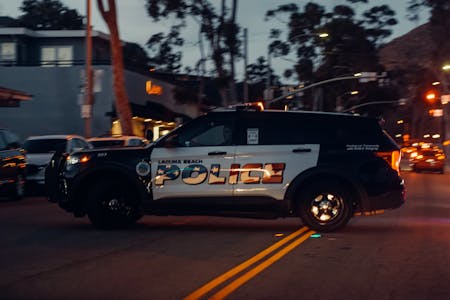

When you’re involved in a car accident, one of the first pieces of advice you often hear is to file a police report. But what if you can’t or don’t get one at the scene?
This guide explores the process of making an insurance claim without a police report, diving into the legal landscape, practical steps, and implications of such scenarios.
Quick Facts About Car Crashes in the United States
| Statistic | Detail |
|---|---|
| Total fatal car accidents in 2020 (U.S.) | 35,766 |
| Total collisions in 2020 | 5,250,837 |
| Fatal accidents due to drunk driving | 35% |
| Deadly accidents due to speeding | 29% |
| Drivers not wearing seatbelts in fatal crashes | 46% |
| Highest state for speed-related fatal accidents | South Carolina (46%) |
| Fatal accidents during nighttime (6 pm to midnight) | 35% |
| Deadliest day for car crashes (annual average) | Independence Day |
| Gender more likely to die in car accidents | Men |
| Highest number of fatal accidents by vehicle type | Passenger cars |
The Importance of Police Reports in Insurance Claims
Police reports serve as a critical piece of evidence in insurance claims, offering an unbiased account of the accident.
They typically include detailed information about the parties involved, the circumstances of the incident, and assessments of damage. This data is invaluable for insurance companies as they decide on claim outcomes.
Legal Requirements for Police Reports
Understanding the legal requirements for police reports after an accident is crucial for anyone involved in a vehicle incident.
Different states have varying laws that dictate when and how a police report should be filed.
Here’s a breakdown of some common legal stipulations you might encounter:
- Many states require a police report if the damage exceeds a certain monetary amount or if there are any injuries.
- Some jurisdictions have specific time frames within which a police report must be filed to be considered valid.
- Certain types of accidents, such as those involving government vehicles or public property, may have mandatory reporting requirements.
- In many cases, it is the responsibility of the driver to ensure that a police report is filed, especially if law enforcement did not respond to the scene.
Scenarios Where a Police Report May Not Be Necessary
There are situations where obtaining a police report isn’t feasible or required.
For example, in minor accidents with no injuries or significant damage, parties often settle the matter without involving the police.
However, even in these cases, documenting the incident thoroughly is essential for any future claims.
Clarification of Common Misconceptions Regarding Police Reports and Insurance Claims
Many believe a police report is mandatory for any insurance claim, but this isn’t always the case.
While it’s true that having one can streamline the claims process, it’s possible to proceed without it.
The key is to provide your insurer with comprehensive, alternative documentation.
Understanding Insurance Claims and Police Reports
Understanding the dynamics of insurance claims and the significance of a police report is crucial for anyone involved in an accident.
This section will delve into what constitutes a police report, its importance in the claims process, and scenarios where you might not need one.
Definition and Role of a Police Report in Insurance Claims
A police report is an authoritative document detailing the facts of an accident. It’s a key piece of evidence that insurance companies rely on to assess the validity of a claim.
The report provides an objective account of the incident, including information about the parties involved, the circumstances of the accident, and the extent of the damages.
Types of Insurance Claims Typically Requiring a Police Report
Most insurance claims, especially those involving significant damages or injuries, require a police report.
This report helps insurance companies determine liability, assess damages, and make decisions about claim payouts.
Without a police report, the claim process can become more complex and challenging.
Situations Where a Police Report is Not Mandatory
Not all accidents necessitate a police report.
In cases of minor fender benders with no injuries and minimal damage, you may not need to file a report.
However, documenting the incident comprehensively remains crucial, as this information can be vital if a claim is later filed.
The Legal Perspective on Police Reports and Insurance Claims
Legally, the requirement for a police report varies by state.
Some states mandate a report for any traffic incident, while others require it only under certain conditions, such as when damages exceed a specific amount or when injuries are involved.
Knowing your state’s laws is essential for ensuring that you fulfill all legal obligations after an accident.
State-by-State Variation in Requirements for Police Reports
The obligation to file a police report differs across the United States, reflecting the diversity of state laws.
Some states have strict requirements, mandating a report for almost any accident, while others are more lenient.
Understanding these variances is crucial for anyone looking to file an insurance claim without a police report.
How to File a Claim Without a Police Report
Filing an insurance claim without a police report can be daunting but not impossible. This section will guide you through the necessary steps to take when you find yourself in a situation where you need to file a claim without the standard police report.
Step-by-Step Guide on Filing an Insurance Claim Without a Police Report
For those needing to file an insurance claim without a police report, there’s a structured approach you can follow to increase your chances of a successful outcome:
- Immediate Notification
- Accident Documentation
- Gather Witness Statements
- Detail Vehicle Damage
- Personal Account
- Keep Records
- Review Your Insurance Policy
- Submit Your Claim
- Claim Follow-Up
- Consult Legal Assistance
Documentation Needed in Lieu of a Police Report
In the absence of a police report, your insurer will need detailed information to process your claim.
This includes the date, time, and location of the accident, descriptions of the vehicles involved, and any damage incurred.
Witness statements and photographic evidence can bolster your claim, providing clarity and support for your account of the events.
Importance of Gathering Detailed Information at the Accident Scene
Collecting detailed information at the scene lays the groundwork for your claim.
Capture clear photos from various angles, showing the overall scene, specific damages, and any relevant street signs or landmarks.
Note weather conditions, traffic patterns, and any other factors that might have contributed to the accident. This information can be invaluable in painting a clear picture of the incident for your insurer.
Role of Witnesses and Their Statements in Absence of a Police Report
Witnesses can play a crucial role in supporting your claim when there’s no police report. Their independent accounts can corroborate your version of events, providing an objective perspective on the incident.
Ensure to collect contact details and, if possible, written statements from any witnesses at the scene.
Tips for Effectively Communicating with Your Insurance Provider Without a Police Report
Clear communication with your insurance provider is paramount when filing a claim without a police report.
Be honest, detailed, and prompt in your interactions. Keep records of all communications and submitted documents.
Be prepared to explain the absence of a police report and provide all the gathered evidence to support your claim.
Potential Challenges and How to Overcome Them
Filing an insurance claim without a police report can present unique challenges. Understanding these potential hurdles and knowing how to address them can make the claims process smoother and increase your chances of a favorable outcome.
Common Obstacles Faced When Filing a Claim Without a Police Report
One major challenge is the insurance company‘s potential skepticism regarding the claim’s validity.
Without a police report, there might be more scrutiny on your provided evidence and account of the incident.
Additionally, determining fault can become more complicated, potentially delaying the claims process.
Strategies for Substantiating Your Claim Without a Police Report
To strengthen your claim, compile as much evidence as possible. This includes photos, witness statements, and detailed notes.
Be proactive in documenting any related expenses or losses. Consistency and detail in your account, paired with solid evidence, can significantly bolster your position.
How Insurance Companies Assess Claims Without Police Reports
Insurance companies typically rely on police reports for an unbiased account of the incident. Without one, they will closely examine the evidence you provide.
Expect questions aimed at piecing together a clear picture of the accident, as the insurer will want to ensure the claim is legitimate and assess the extent of any damages or injuries.
Legal Rights and Consumer Protection in the Claims Process
Understanding your legal rights is crucial when filing a claim without a police report. You’re entitled to a fair assessment of your claim based on the evidence you provide.
If you feel your claim isn’t being evaluated fairly, you may consider seeking legal advice or contacting your state’s insurance commissioner’s office.
Navigating the Claims Process Without a Police Report
While facing these challenges, staying informed and prepared is vital.
Keep detailed records, be persistent in your communications, and consider consulting with a legal professional if you encounter significant hurdles.
Legal professionals can provide guidance, ensuring you understand your rights and options throughout the claims process.
Contact Goldenzweig Law for Expert Car Accident Attorney Assistance
Navigating an insurance claim after a car accident can be complex, especially without a police report.
If you’re facing this challenge, Goldenzweig Law is here to help. As your car accident attorney, we provide the guidance and support you need to ensure your claim is handled properly.
Call us at 713-903-3988 to discuss your case and find out how we can assist you in securing the compensation you deserve.
Navigation
Related Posts


What is a Non Dot Recordable Accident?
Continue Reading

